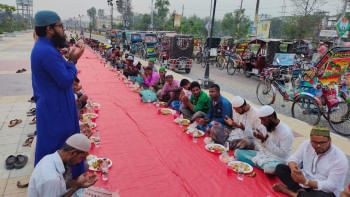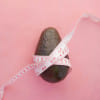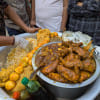The dining table during iftar is often crowded with delicacies of all sorts. The assortment includes traditional iftar items and not-so-traditional items which may even border on eccentricity that leaves others questioning about your taste (and sanity).
Call it "iftar cuisine" if you like, as an iftar spread is a whole different genre of food altogether! So, we asked around what people enjoy eating in their first meal of the day.

An obvious choice for breaking the fast is dates. Quite understandable, as it is a tradition and is a healthy and delightful treat, especially given the fact that there are plenty of options out there, including those with chocolates.
In addition to khejur, a cold glass of lemonade after a hot and humid day brings back life to me. So rejuvenating!

Drinks of several kinds are common during iftar, from the mood-killer bel er shorbot that is pushed by health-conscious mums and dads, to the exquisite badamer shorbot — which, I once had an entire litre of, followed by an urgent visit to the ER.
After that episode, I stick to classics like the lemonade (and keep an eye out on the amount as well).
The league of classics when it comes to iftar drinks surely includes Rooh Afza.
Riazul Islam, a college teacher, who is a fan of this "elixir", speaks of his love, "It is truly a soul refresher! I usually have it after the main course, using it as a syrup with cold milk."
Speaking of drinks, have you ever realised that the humble glass of water often goes unnoticed until much later?
Meanwhile, piyaju, beguni, chola, jilapi, and halim are the usual suspects which ignite the most passion among people.
To illustrate, Tamim Faroque, a university student, often returns home for iftar with a bowl of halim. "The other day, I overheard someone asking a street vendor for chicken halim. The audacity! If it's not mutton or beef, it's not halim at all," he exclaimed.
Such strong preference is also shared by Cynthia, a seasonal jilapi aficionado hailing from Mirpur. "Thin jilapis are the craze and 'less is more' is the mantra," she opines.

The menu goes much beyond. I learned this the hard way, as my iftar staple is plain rice and chicken curry. Everyone judges me when I mention this.
Look, I'm not heartless. I do steal a couple of piyajus or have some doi bora later, and I also remember how melancholy gripped me when I lived in Cardiff, away from my family. I used to toss all sorts of fried stuff in the frying pan, and through that process also introduced many deshi items to my non-Bangladeshi, non-Asian housemates.
But, am I the only one with an appetite for questionable iftar items like bhaat? My wife's favourites are corn soup and wonton! I remain silent, trying to remind myself that mutual respect is the key to a successful marriage.
Back to the usual suspects, muri makha is definitely on everyone's minds, often after the Maghrib prayer. Now, this can be an elaborate affair. At homes, shops, or office cafeterias, a senior and experienced member is entrusted to make the impossible muri makha, adding a rather long list of ingredients — from leftover cholas and piyajus to kebabs and even jilapis!
Back again to the more controversial choices, surveying around has made me frown several times. How about spicy Bombay toast, chocolate milkshake, and morogh polao for iftar? Sounds rich! Turkish yoghurt soup? That's fancy! Nihari? Let's reserve it for a winter Ramadan. Sandwiches and a cup of coffee? Sorry, but my life is as not sad as yours.

At the end of the day (literally), favourite iftar items are about personal preferences. I know mine is paapar and achar, ever since the time I had it at a friend's house many years back. On the other hand, poneer in some form or other — poneer sticks, poneer samosa, and the like — seems to be highly sought after. I also keep hearing about khichuri, perhaps due to the rains we have been seeing in recent years during Ramadan. The list continues and there's an entire month to try them all!









Comments